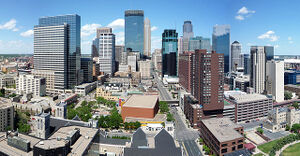Minneapolis (nonfiction): Difference between revisions
No edit summary |
No edit summary |
||
| Line 8: | Line 8: | ||
Minneapolis' name is attributed to Charles Hoag, the city's first schoolteacher, who combined ''mni'', a Dakota Sioux word for water, and ''polis'', the Greek word for city. | Minneapolis' name is attributed to Charles Hoag, the city's first schoolteacher, who combined ''mni'', a Dakota Sioux word for water, and ''polis'', the Greek word for city. | ||
== Favorite places == | |||
* [http://www.howempls.com/ The Howe] - Restaurant @ 3675 Minnehaha Ave. S. | |||
== In the News == | == In the News == | ||
Revision as of 10:13, 15 July 2019
Minneapolis (Listeni/ˌmɪniˈæpəlɪs/) is the county seat of Hennepin County,and larger of the Twin Cities, the 14th-largest metropolitan area in the United States, containing approximately 4.1 million residents.
Minneapolis lies on both banks of the Mississippi River, just north of the river's confluence with the Minnesota River, and adjoins Saint Paul, the state's capital.
The city is abundantly rich in water, with twenty lakes and wetlands, the Mississippi River, creeks and waterfalls, many connected by parkways in the Chain of Lakes and the Grand Rounds National Scenic Byway.
It was once the world's flour milling capital and a hub for timber, and today is the primary business center between Chicago and Seattle, with Minneapolis proper containing America's fifth-highest concentration of Fortune 500 companies.
Minneapolis' name is attributed to Charles Hoag, the city's first schoolteacher, who combined mni, a Dakota Sioux word for water, and polis, the Greek word for city.
Favorite places
- The Howe - Restaurant @ 3675 Minnehaha Ave. S.
In the News
Fiction cross-reference
Nonfiction cross-reference
External links:
- Minneapolis @ wiki.karljones.com
- Minneapolis @ Wikipedia

